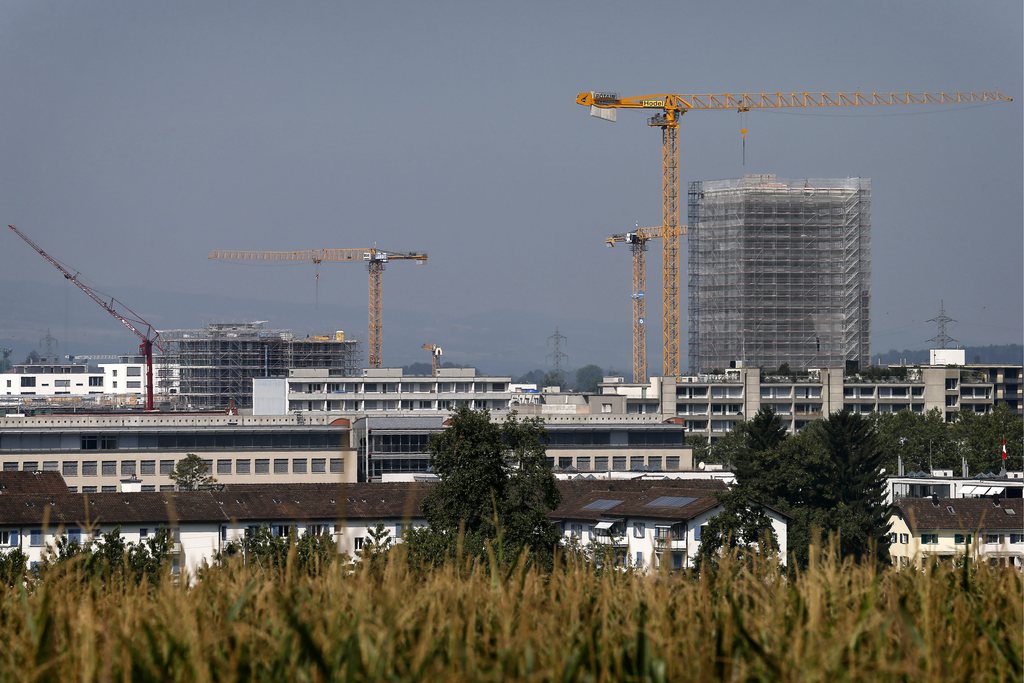Immigration caps to reduce ecological footprint

A controversial approach to reduce population growth in Switzerland will be decided by voters on November 30. The Ecopop initiative wants to curb immigration and promote birth control in developing countries.
Under the plan by the group of ecologists behind Ecopop, net immigration – the number of immigrants minus the number of emigrants – shouldn’t exceed 0.2% of the population over a three year average.
Ecopop also wants at least 10% of the government’s development aid spent on voluntary family planning.
The initiative garnered about 119,000 signatures from citizens in less than 18 months – more than enough required for a nationwide ballot on the constitutional amendment.
“Ecopop wants not only to contribute to a sustainable quality of life in Switzerland. We also want to reduce the inconceivable misery of people in disadvantaged regions of this world,” says Alec Gagneux.
He is a leading member of the campaign committee without any party affiliation and an trained engineer.
Human right
Calling for a smaller ecological footprint of mankind on the planet, the group says voluntary family planning is a basic human right declared by the United Nations in 1968.
Gagneux accuses the industrialised world of blatant selfishness, showing a lack of “empathy with the people in the developing countries”.
The campaigner, who has been working as an independent development aid consultant, says 222 million women have neither access to birth control devices nor to information about family planning. “Two out of five pregnancies are unwanted.”
Ecopop criticises the Swiss government’s development aid policy for neglecting efforts to boost birth control in the poorest countries and focusing instead on other projects in these parts of the world.
There is strong opposition to the initiative, including the governmentExternal link and all the main political parties, the business community, trade unions, churches and most charities.
The consensus was that the initiative is too strict, damaging for Switzerland, its economic prosperity and its humanitarian tradition.
“No international treaty could be signed that could block or hinder the allocation of at least 10% of the funds. Switzerland would invent a 21st century-style of colonialism,” said Isabelle Moret of the centre-right Radical Party.
Social Democrat Silvia Schenker argued the initiative was misleading. “The link between restricted immigration and family planning is arbitrary, its content is absurd and it insinuates an impact that is not real.”
Several centrist Christian Democrats tried in vain to win a majority to declare the initiative invalid for legal reasons.
On the political left and right, some members expressed a certain understanding for the aims of Ecopop to reduce mankind’s ecological footprint, but they denounced the way the campaigners have addressed the issue.
Births and economic prosperity
The leading business lobby, the Swiss Business FederationExternal link has warned that a de-facto limit of 16,000 immigrants per year would throttle Switzerland’s economic development.
Chief economist Rudolf Minsch has argued that the country needs skilled foreign labour to make up for an ageing population.
No support for the initiative has come from charities either. The Alliance SudExternal link umbrella group dismissed the Ecopop initiative as absurd.
Its director Peter Niggli says birth control alone cannot tackle the problem of alleged overpopulation of the planet.
“The number of births worldwide is decreasing. The population will continue to grow until the middle of the century as a result of the higher life expectancy in developing countries.”
Even the Swiss Abroad Council at its meeting in August in Aarau issued a recommendation to reject the proposal.
Few backers
Support for the initiative is thin, with only a small handful of politicians backing it and only one, Thomas Minder, taking an active part in debates on the issue, which were largely focused on the approval of a rightwing initiative in February to introduce immigration quotas.
Minder, a senator with a maverick reputation but close links to the rightwing People’s Party, has argued in favour of the Ecopop initiative, both for fundamental and tactical reasons.
Disappointed that his fellow senators rejected his plea for a counter-proposal, he called for a protest vote.
“I have no confidence in parliament and the government to curb immigration drastically,” Minder said.
He is concerned that an increasing amount of foreign labour would put job security for Swiss workers at risk and jeopardise the country’s social security system.
Minder added that voters expected the authorities to reduce the influx by up to 40% following the approval of the February initiative on quotas. The government is currently preparing the necessary legal amendments to apply the rightwing initiative by 2017, which have led to tensions with the European Union.
For his part, Lukas Reimann, one of three members of the House of Representatives to recommend approval of the Ecopop initiative, declined to explain the reason for his support.
Growth
The Ecopop groupExternal link was founded in the early 1970s by a group of activists led by university scientists seeking to raise public awareness of the impact of population growth on the environment.
Inspired by a report of the international Club of Rome think tank, the Swiss lobby group campaigned both against government plans to boost the number of immigrants and also against proposals by a far-right political National Action Party to curb immigration in the 1980s and 1990s.
The latter is explained by Ecopop’s stated position rejecting xenophobic or racist views. Its aim is to stabilise the number of residents in Switzerland. With its just under 8.2 million inhabitants Switzerland is now one of the most densely populated countries in Europe the campaigners argue.
The group is concerned that there could be more than ten million people in Switzerland by 2025 and that could increase to 13.8 million by 2050 if nothing is done to contain immigration. This would lead to Switzerland increasing its ecological footprint – currently 4.3 times above the human demand on nature.
The following table shows the population growth since 1900 and two different collated scenarios for the future.
Ecopop cooperates with like-minded organisations in ten countries fighting for a restrictive immigration policy for ecological reasons.
It is the first time that the group has launched a people’s initiative, winning the necessary public support for a nationwide vote.
November 30 vote – Three issues
Apart from the proposal to curb immigration for ecological reasons there are two other constitutional amendments at stake.
An initiative by the leftwing Alternative Left group to do away with lump sum taxation – a preferential fiscal regime for wealthy foreign residents in Switzerland.
A third initiative by a rightwing committee wants to ban the sale of gold by the National Bank. It commits the central bank to keeping at least 20% of its reserves in gold and to store it in Switzerland.
It is the fourth and final set of ballots this year.
Vote and elections also take place in many of the country’s cantons and communes on November 30.

In compliance with the JTI standards
More: SWI swissinfo.ch certified by the Journalism Trust Initiative




You can find an overview of ongoing debates with our journalists here. Please join us!
If you want to start a conversation about a topic raised in this article or want to report factual errors, email us at english@swissinfo.ch.